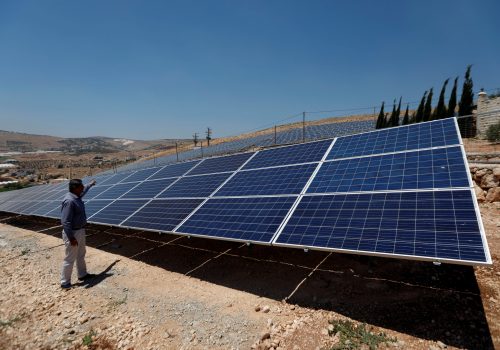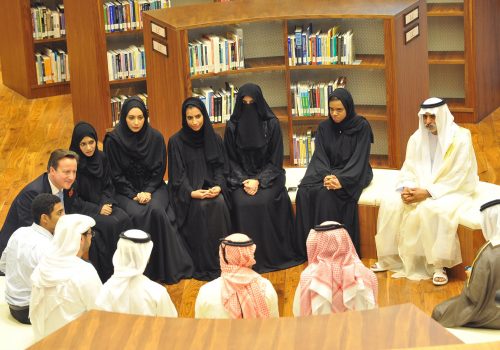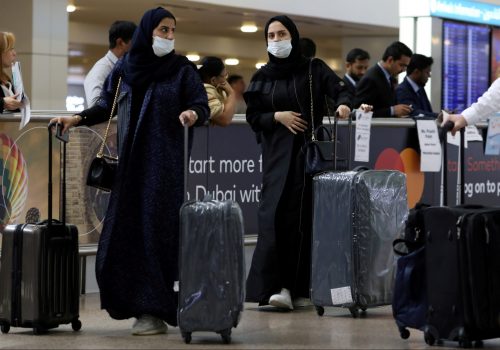Soccer for peace in the Middle East and North Africa
One of the earliest athletic competitions was rooted in peace. It started with the first Olympics in 776 BCE, when the ancient Greek city-states observed a truce before, during, and immediately after the games to ensure that the host city-state was not attacked and that athletes could travel safely to and from the games.
In 2022, more than two millennia later, Qatar will host the FIFA World Cup—the first time the region will host the quadrennial celebration of the sport—in a region beset by tensions similar to those that engulfed the often-warring Greek city-states. Handled properly, the World Cup can not only help ease some political tensions, but also serve as a magnet for considerable regional investment that would stimulate tourism, employment, advertising revenue, and public relations in the Middle East and North Africa (MENA).
More importantly, the World Cup also symbolizes soccer’s spirit: unfettered competition, meritocracy, and team play. This is especially compelling for the region’s youth, who make up the majority of the population in the region and face grim economic and social realities in the relatively stagnant MENA economies, which are plagued by favoritism and outdated or excessively constraining regulations.
But to achieve the potential augured by the World Cup, MENA countries must come to terms with regional conflicts and tensions—including the one implicating host Qatar and its Gulf neighbors. The Gulf Cooperation Council (GCC) is an economic and political alliance of the six Gulf countries—Bahrain, Kuwait, Oman, Qatar, Saudi Arabia, and the United Arab Emirates (UAE)—that dates back to 1981.
At one point, GCC countries sought an even tighter union that would eventually lead to a common currency, among other things. But, today, the union is imperiled by a severe internal rift. In 2017, Saudi Arabia, the UAE, and Bahrain—as well as several non-GCC affiliated Arab countries—severed ties and imposed an economic blockade on Qatar. That rupture among neighbors formerly integrated in the GCC echoes the situation for the rest of the go-it-alone countries in MENA—a region considered the least integrated in the world despite the potential gains from integration.
Most MENA countries, which are small markets individually, are foregoing economic gains from further economic integration, limiting commerce and job creation for their youth. A more economically unified MENA would attract more foreign direct investment, both from within and outside the region, and would help create good jobs, as opposed to low-paid informal work. MENA countries are less integrated with each other than with Europe—though they trade more with the continent—and, increasingly, East Asia. Poor logistics and lack of cross-border payment systems make regional integration more difficult than with countries farther away. The situation seems at odds with the long tradition of traveling Arab merchants and flourishing commerce that once made the region a beacon of prosperity and peace.
The Qatar 2022 World Cup provides an opportunity to make soccer work for peace, which in turn could lead to further integration. In recent years, some bids to host the World Cup have involved more than one country. The 2002 World Cup was jointly hosted by Japan and South Korea, which have historic tensions, while the 2026 iteration will take place in Mexico, the United States, and Canada. Multi-country bids are a good way to maximize the chances of success and also help spread the normally large costs of hosting the month-long event. Additionally, they signal to would-be tourists and investors that the region is open for business.
Qatar has been designated as the sole host country in 2022, but it would be an extraordinary gesture were the Gulf nation—with the blessing of the international governing body, FIFA which has expressed wishes to that effect—to invite Saudi Arabia, the UAE, Kuwait, Oman and Bahrain to co-host some matches. If the leaders of these countries accept the offer, it would send a powerful signal of hope and unity to the region’s people.
It need not stop in 2022. Morocco is in the running for the 2030 World Cup and there has been talk of launching a joint bid with Tunisia and Algeria. Over the past decades, increased terrorist activity and other interstate factors have led countries in the Maghreb to impose border restrictions while overlooking the importance of building strong economic ties. A show of unity on the part of these North African neighbors would rekindle the drive for more economic integration of the Maghreb and bring opportunities for a young population eager for a more hopeful future.
The MENA region is at a crossroads. The coronavirus pandemic calls for more coordination and solidarity between bordering states. Qatar and its Gulf neighbors have an opportunity to use the 2022 World Cup to diffuse tensions amongst themselves and in the region. Although uniting around sport might be mainly symbolic, it could also be a confidence-building effort that could reduce tension and increase integration in a region that would mightily benefit from both.
Rabah Arezki is a senior fellow at the Middle East Initiative at Harvard’s Kennedy School of Government.
Image: A stadium official explains to media the layout of the Education City Stadium built for the upcoming 2022 FIFA World Cup soccer championship during a stadium tour in Doha, Qatar, December 15, 2019. REUTERS/Kai Pfaffenbach


